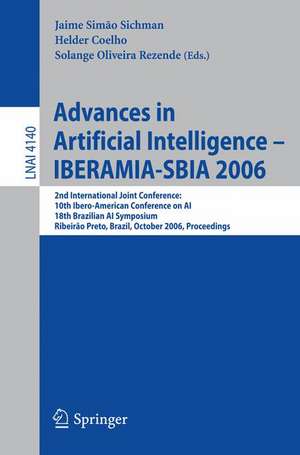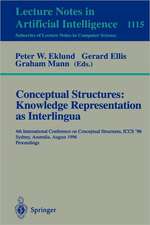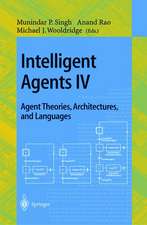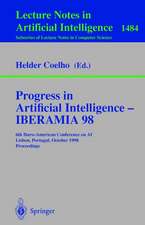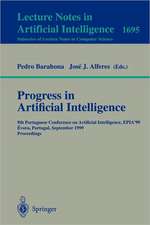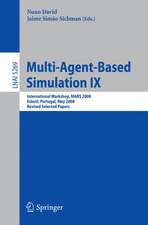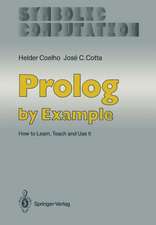Advances in Artificial Intelligence - IBERAMIA-SBIA 2006: 2nd International Joint Conference, 10th Ibero-American Conference on AI, 18th Brazilian AI Symposium, Ribeirao Preto, Brazil, October 23-27, 2006: Lecture Notes in Computer Science, cartea 4140
Editat de Jaime Simao Sichman, Helder Coelho, Solange Oliveira Rezendeen Limba Engleză Paperback – 6 oct 2006
Din seria Lecture Notes in Computer Science
- 20%
 Preț: 1061.55 lei
Preț: 1061.55 lei - 20%
 Preț: 307.71 lei
Preț: 307.71 lei - 20%
 Preț: 438.69 lei
Preț: 438.69 lei - 20%
 Preț: 579.30 lei
Preț: 579.30 lei -
 Preț: 410.88 lei
Preț: 410.88 lei - 17%
 Preț: 427.22 lei
Preț: 427.22 lei - 20%
 Preț: 596.46 lei
Preț: 596.46 lei - 15%
 Preț: 448.04 lei
Preț: 448.04 lei - 20%
 Preț: 353.50 lei
Preț: 353.50 lei -
 Preț: 389.49 lei
Preț: 389.49 lei - 20%
 Preț: 309.90 lei
Preț: 309.90 lei - 20%
 Preț: 645.28 lei
Preț: 645.28 lei - 20%
 Preț: 763.23 lei
Preț: 763.23 lei - 15%
 Preț: 580.46 lei
Preț: 580.46 lei - 20%
 Preț: 310.28 lei
Preț: 310.28 lei - 20%
 Preț: 655.02 lei
Preț: 655.02 lei - 20%
 Preț: 1183.14 lei
Preț: 1183.14 lei - 20%
 Preț: 340.32 lei
Preț: 340.32 lei -
 Preț: 449.57 lei
Preț: 449.57 lei - 20%
 Preț: 591.51 lei
Preț: 591.51 lei - 18%
 Preț: 938.83 lei
Preț: 938.83 lei - 20%
 Preț: 337.00 lei
Preț: 337.00 lei - 20%
 Preț: 649.50 lei
Preț: 649.50 lei - 20%
 Preț: 607.40 lei
Preț: 607.40 lei - 20%
 Preț: 1414.79 lei
Preț: 1414.79 lei - 20%
 Preț: 1024.44 lei
Preț: 1024.44 lei - 20%
 Preț: 583.40 lei
Preț: 583.40 lei - 20%
 Preț: 453.32 lei
Preț: 453.32 lei - 20%
 Preț: 575.49 lei
Preț: 575.49 lei - 20%
 Preț: 1075.26 lei
Preț: 1075.26 lei - 20%
 Preț: 585.88 lei
Preț: 585.88 lei - 20%
 Preț: 825.93 lei
Preț: 825.93 lei - 17%
 Preț: 360.20 lei
Preț: 360.20 lei - 20%
 Preț: 763.23 lei
Preț: 763.23 lei - 20%
 Preț: 340.32 lei
Preț: 340.32 lei - 20%
 Preț: 504.58 lei
Preț: 504.58 lei - 20%
 Preț: 369.13 lei
Preț: 369.13 lei - 20%
 Preț: 580.93 lei
Preț: 580.93 lei - 20%
 Preț: 343.62 lei
Preț: 343.62 lei - 20%
 Preț: 350.21 lei
Preț: 350.21 lei - 20%
 Preț: 583.40 lei
Preț: 583.40 lei - 20%
 Preț: 583.40 lei
Preț: 583.40 lei - 15%
 Preț: 438.59 lei
Preț: 438.59 lei - 20%
 Preț: 341.95 lei
Preț: 341.95 lei - 20%
 Preț: 238.01 lei
Preț: 238.01 lei - 20%
 Preț: 538.30 lei
Preț: 538.30 lei
Preț: 663.94 lei
Preț vechi: 829.92 lei
-20% Nou
Puncte Express: 996
Preț estimativ în valută:
127.06€ • 137.97$ • 106.73£
127.06€ • 137.97$ • 106.73£
Carte tipărită la comandă
Livrare economică 22 aprilie-06 mai
Preluare comenzi: 021 569.72.76
Specificații
ISBN-13: 9783540454625
ISBN-10: 3540454624
Pagini: 664
Ilustrații: XXIII, 635 p.
Dimensiuni: 155 x 235 x 35 mm
Greutate: 0.93 kg
Ediția:2006
Editura: Springer Berlin, Heidelberg
Colecția Springer
Seriile Lecture Notes in Computer Science, Lecture Notes in Artificial Intelligence
Locul publicării:Berlin, Heidelberg, Germany
ISBN-10: 3540454624
Pagini: 664
Ilustrații: XXIII, 635 p.
Dimensiuni: 155 x 235 x 35 mm
Greutate: 0.93 kg
Ediția:2006
Editura: Springer Berlin, Heidelberg
Colecția Springer
Seriile Lecture Notes in Computer Science, Lecture Notes in Artificial Intelligence
Locul publicării:Berlin, Heidelberg, Germany
Public țintă
ResearchCuprins
Invited Speakers.- Organizing Software Agents.- Learning, Logic, and Probability: A Unified View.- Reinventing Machine Learning with ROC Analysis.- Cocktail Party Processing.- AI in Education and Intelligent Tutoring Systems.- Diagnostic of Programs for Programming Learning Tools.- Intelligent Learning Objects: An Agent Approach to Create Reusable Intelligent Learning Environments with Learning Objects.- An Experimental Study of Effective Feedback Strategies for Intelligent Tutorial Systems for Foreign Language.- Autonomous Agents and Multiagent Systems.- Coordination with Collective and Individual Decisions.- Negotiator Agents for the Patrolling Task.- Running Agents in Mobile Devices.- A Multi Agent Based Simulator for Brazilian Wholesale Electricity Energy Market.- Using IDEF0 to Enhance Functional Analysis in OISE?+? Organizational Modeling.- Simulations Show That Shame Drives Social Cohesion.- SILENT AGENTS: From Observation to Tacit Communication.- Simulating Working Environments Through the Use of Personality-Based Agents.- GAPatrol: An Evolutionary Multiagent Approach for the Automatic Definition of Hotspots and Patrol Routes.- Learning by Knowledge Sharing in Autonomous Intelligent Systems.- Formal Analysis of a Probabilistic Knowledge Communication Framework.- Computer Vision and Pattern Recognition.- Color Image Segmentation Through Unsupervised Gaussian Mixture Models.- An Image Analysis Methodology Based on Deterministic Tourist Walks.- Feature Characterization in Iris Recognition with Stochastic Autoregressive Models.- Cryptographic Keys Generation Using FingerCodes.- Evolutionary Computation and Artificial Life.- Using Computational Intelligence and Parallelism to Solve an Industrial Design Problem.- Two-Phase GA-Based Model to Learn GeneralizedHyper-heuristics for the 2D-Cutting Stock Problem.- Mirrored Traveling Tournament Problem: An Evolutionary Approach.- Pattern Sequencing Problems by Clustering Search.- Hybrid Systems (Fuzzy, Genetic, Neural, Symbolic).- Development of a Hybrid Intelligent System for Electrical Load Forecasting.- Extending a Hybrid CBR-ANN Model by Modeling Predictive Attributes Using Fuzzy Sets.- Development of a Neural Sensor for On-Line Prediction of Coagulant Dosage in a Potable Water Treatment Plant in the Way of Its Diagnosis.- Multi-objective Memetic Algorithm Applied to the Automated Synthesis of Analog Circuits.- A Hybrid Learning Strategy for Discovery of Policies of Action.- Knowledge Acquisition and Machine Learning.- A Fractal Dimension Based Filter Algorithm to Select Features for Supervised Learning.- Comparing Meta-learning Algorithms.- A New Linear Dimensionality Reduction Technique Based on Chernoff Distance.- A Machine Learning Approach to the Identification of Appositives.- Parameterized Imprecise Classification: Elicitation and Assessment.- Evolutionary Training of SVM for Multiple Category Classification Problems with Self-adaptive Parameters.- Time-Space Ensemble Strategies for Automatic Music Genre Classification.- Predictive and Descriptive Approaches to Learning Game Rules from Vision Data.- Knowledge Discovery and Data Mining.- Mining Intonation Corpora Using Knowledge Driven Sequential Clustering.- Using Common Sense to Recognize Cultural Differences.- Detection of Repetitive Patterns in Action Sequences with Noise in Programming by Demonstration.- Knowledge Engineering, Ontologies and Case Based Reasoning.- Supporting Ontology-Based Semantic Matching of Web Services in MoviLog.- Learning Similarity Metrics from Case Solution Similarity.- Knowledge Representation and Reasoning.- Epistemic Actions and Ontic Actions: A Unified Logical Framework.- Strings and Holes: An Exercise on Spatial Reasoning.- A Causal Perspective to Qualitative Spatial Reasoning in the Situation Calculus.- PFORTE: Revising Probabilistic FOL Theories.- Rule Schemata for Game Artificial Intelligence.- Neutral Language Processing.- Selecting a Feature Set to Summarize Texts in Brazilian Portuguese.- Word Sense Disambiguation Based on Word Sense Clustering.- Comparing Two Markov Methods for Part-of-Speech Tagging of Portuguese.- Shallow Parsing Based on Comma Values.- Planning and Scheduling.- Unifying Nondeterministic and Probabilistic Planning Through Imprecise Markov Decision Processes.- Achieving Conditional Plans Through the Use of Classical Planning Algorithms.- Assessing the Value of Future and Present Options in Real-Time Planning.- Reading PDDL, Writing an Object-Oriented Model.- Robotics.- A Reactive Lazy PRM Approach for Nonholonomic Motion Planning.- Negative Information in Cooperative Multirobot Localization.- Gait Control Generation for Physically Based Simulated Robots Using Genetic Algorithms.- Does Complex Learning Require Complex Connectivity?.- Theoretical and Logical Methods.- The Predicate-Minimizing Logic MIN.- Strong Negation in Well-Founded and Partial Stable Semantics for Logic Programs.- MAT Logic: A Temporal×Modal Logic with Non-deterministic Operators to Deal with Interactive Systems in Communication Technologies.- Uncertainty.- Probabilistic Logic with Strong Independence.- Bayesian Model Combination and Its Application to Cervical Cancer Detection.
